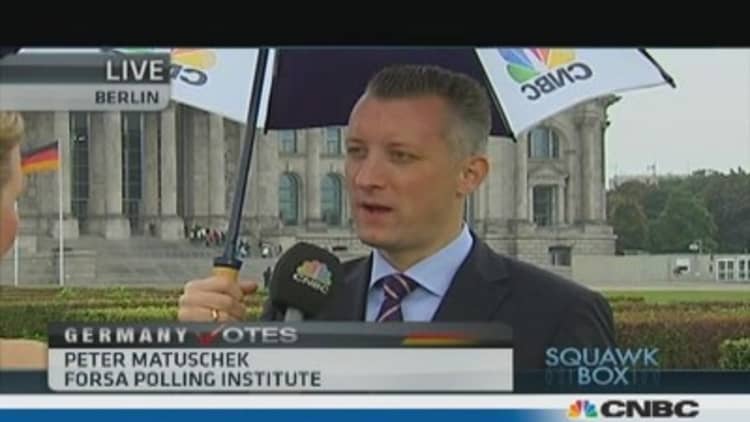German Chancellor Angela Merkel received a boost this weekend when her allies won a key state election, but the vote could signal the end of her current conservative alliance after national elections on September 22.
The Christian Social Union (CSU) party -- the sister party of Merkel's Christian Democrats (CDU) currently governing together in a coalition -- regained an absolute majority in Bavarian elections on Sunday, showing public support for the conservatives is strong ahead of national elections next week.
However, the pro-business Free Democrats (FDP) party, a junior coalition party in Merkel's center-right conservative alliance, failed to gain the 5 percent of votes in needs to re-enter parliament. If it repeats the defeat at a national level, Merkel could be forced into an uncomfortable coalition with the main opposition party, the Social Democrats party (SPD).
(Read more: German elections: Bavaria's 'alpha male' vote is key)
The Bavarian vote could prompt many Germans who don't want to see the coalition broken up to vote tactically in next Sunday's election for the FDP. Indeed, after the result in Bavaria the head of the defeated FDP said the result was a "wake up call to all liberals in Germany."
Scope for surprises
One analyst said it was too early to predict what could happen when Germans go to the polls next Sunday, however. "I think it's important not to read too much into one result," Michael Hewson, senior market analyst at CMC Markets, told CNBC on Monday.
(Read more: Forget Berlusconi: Germany may be Italy's biggest concern)
"But if this pattern of FDP weakness is replicated across the country it could well give the Chancellor some problems in terms of the electoral mathematics after the election. Time will tell but this result certainly keeps things interesting in the run up to this weekend's election."
The head of Political Research at the Forsa Polling Institute, which follows voter polls in the run up to the German election, told CNBC that he did not believe the result would throw up many surprises in terms of leadership.
"The one thing which is for sure is that Angela Merkel will remain chancellor after next Sunday as [her] party has a considerable lead," Peter Matuschek told CNBC on Monday.
"The question is what coalition will be the most likely and right now we have a slight majority still for the governing coalition, but the most likely outcome is to have a grand coalition of the SPD and CDU."

Other economists were not convinced that a grand coalition was a done deal, however.
Carsten Brzeski, a senior economist at ING, said in a note on Monday that the identity of the next coalition partner "should remain unclear until the very last minute."
Meanwhile, the chief economist of the German Chamber of Industry and Commerce (DIHK) said the Bavarian elections did not signal the end for the current coalition.
"It's a strong sign that the offering from the CDU and its coalition partners can count on next Sunday and there are all the chances for the current government to win the vote," Dr. Alexander Schumann told CNBC on Monday.
- By CNBC's Holly Ellyatt, follow her on Twitter @HollyEllyatt. Follow us on Twitter: @CNBCWorld



